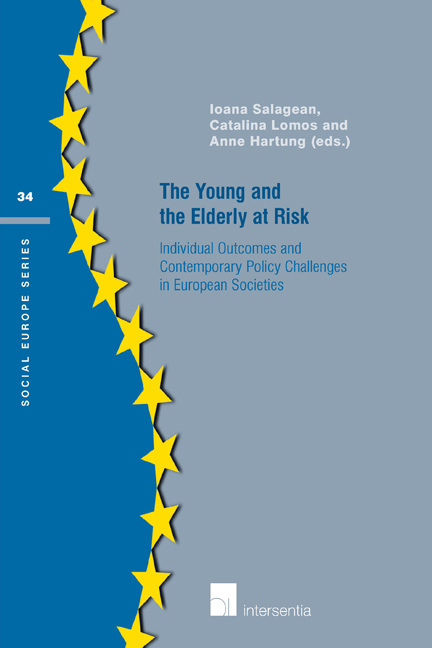 The Young and the Elderly at Risk
The Young and the Elderly at Risk Book contents
- Frontmatter
- Abstract
- Dedication
- Acknowledgements
- Preface
- Contents
- Introduction
- Chapter 1 Does Ethnic Capital Contribute to the Educational Outcomes of Individuals with Turkish Background in Europe?
- Chapter 2 Young Adults at Risk in Germany: the Impact of Vocational Training on the Ethnic Gap At Labour Market Entry
- Chapter 3 Poverty Among Elderly Immigrants in Belgium
- Chapter 4 Integrating Life Course and Pension Policy Perspectives: The Case of Poverty Among Elderly Women
- Chapter 5 Including Assets in Comparative Old-Age Poverty Research: How Does it Change the Picture?
- Chapter 6 The Social and Budgetary Impacts of the Recent Social Security Reform in Belgium
- Chapter 7 Cross-Border Social Security Coordination, Mobility of Labour and Pension Outcomes
- Chapter 8 Do Self-Interest, Ideology and National Context Influence Opinions on Government Support for Childcare for Working Parents?: A Multilevel Analysis
- Chapter 9 Individual Attitudes Towards Welfare States Responsibility for the Elderly
- Rejoinder: Is Intergenerational Solidarity Under Pressure? Comparative Analyses of Age Cleavages in Opinions About Government Support for the Young and the Old
- Biographical Notes
Chapter 3 - Poverty Among Elderly Immigrants in Belgium
Published online by Cambridge University Press: 13 December 2017
- Frontmatter
- Abstract
- Dedication
- Acknowledgements
- Preface
- Contents
- Introduction
- Chapter 1 Does Ethnic Capital Contribute to the Educational Outcomes of Individuals with Turkish Background in Europe?
- Chapter 2 Young Adults at Risk in Germany: the Impact of Vocational Training on the Ethnic Gap At Labour Market Entry
- Chapter 3 Poverty Among Elderly Immigrants in Belgium
- Chapter 4 Integrating Life Course and Pension Policy Perspectives: The Case of Poverty Among Elderly Women
- Chapter 5 Including Assets in Comparative Old-Age Poverty Research: How Does it Change the Picture?
- Chapter 6 The Social and Budgetary Impacts of the Recent Social Security Reform in Belgium
- Chapter 7 Cross-Border Social Security Coordination, Mobility of Labour and Pension Outcomes
- Chapter 8 Do Self-Interest, Ideology and National Context Influence Opinions on Government Support for Childcare for Working Parents?: A Multilevel Analysis
- Chapter 9 Individual Attitudes Towards Welfare States Responsibility for the Elderly
- Rejoinder: Is Intergenerational Solidarity Under Pressure? Comparative Analyses of Age Cleavages in Opinions About Government Support for the Young and the Old
- Biographical Notes
Summary
ABSTRACT
After the Second World War, Belgium – as other Western countries – welcomed a large amount of immigrant workers. These post-war immigration waves of mainly Italian, Turkish and Moroccan ‘guest workers’ are now retiring in large numbers. As various studies have focused on the (inferior) labour market position of these immigrants, one could expect these immigrants to be especially vulnerable later in life. So far, however, no information is available on their financial situation at old age. This paper will therefore analyse differences in poverty risks between immigrants and non-immigrants as well as between different groups of immigrants. The first aim of this paper is to describe the poverty incidence among elderly immigrants. The second aim is to examine the effect of the intermediate mechanisms, mentioned above, that link ethnicity to poverty. Our final goal is to investigate whether the indicators that have shown to protect non-immigrants against poverty are similar for immigrants. For this investigation, we make use of an administrative data set of 93.657 people (of which almost 20.000 with migration background) 65 years and older in 2008 and living in Belgium.
Keywords: immigrants, pensions, poverty, labour market career, household Composition
INTRODUCTION
After the Second World War, Belgium – along with other Western countries – welcomed a large number of immigrant workers to primarily help man the coal industry. Today, these post-war immigration waves of mainly Italian, Turkish and Moroccan ‘guest workers’ are retiring in large numbers. However, despite the strong research tradition on poverty risk of non-immigrant elderly in Belgium, little is known about the poverty risk of elderly immigrants as research on differences in poverty between ethnicities remains scarce, especially when compared to the abundant Anglo-Saxon research literature. Different aspects are believed to influence old-age poverty risk. As pensions are the most important income source in later life (Choi, 2006), the level of pension benefits very likely determines poverty risk. Indirectly then, poverty will be influenced by former labour market patterns and family trajectories, the main determinants of pension benefits in Belgium (Peeters, De Tavernier & Berghman, 2013).
- Type
- Chapter
- Information
- The Young and the Elderly at RiskIndividual outcomes and contemporary policy challenges in European societies, pp. 57 - 84Publisher: IntersentiaPrint publication year: 2015
